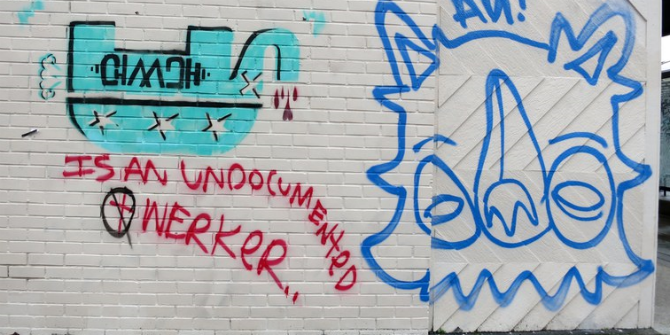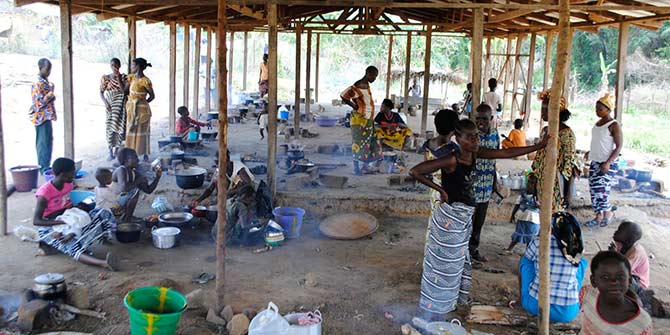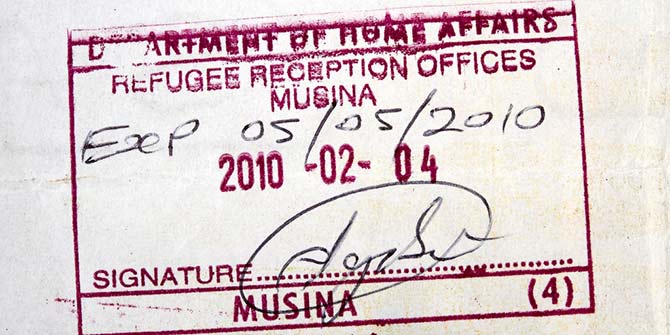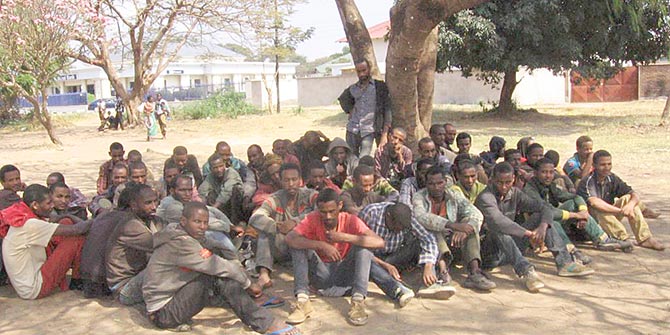Researcher-artist Bathsheba Okwenje contrasts the visa requirements for a Ugandan national visiting the UK with a UK national visiting Uganda. While highlighting how some passports carry certain privileges, more hidden is the emotional tax non-privileged passport-holders pay by wanting to explore the world, by needing to prove they are worthy of travel in a country that is not their own.
This post is part of a mini-series exploring the global inequalities of the visa system and its effects.

I am a Ugandan national living in Rwanda. The items listed in the left hand column above, along with a 12-page visa application, were requirements for me to attain a visitor’s visa to the UK to attend an event at the London School of Economics, where my artwork was being exhibited.
It’s interesting to make a comparative list of visa requirements, highlighting that some people carry a passport with privileges, and others don’t. To me, it’s a clear illustration of the many divergent ways in which the world rises to meet and support those with privilege and the way it doesn’t for those without.

It reminds me of a time some years ago when I was completing an MFA in the USA. We were heading back from a class trip to India. The scheduled plane was delayed or cancelled and we were put on a plane that transited in Munich. Due to the delay, we missed the connection and had to spend the night there. My fellow classmates, all of whom were American or Canadian, were given individual rooms at a nearby hotel for the night as well as complimentary dinner and breakfast. Because of my nationality, I was given a €10 voucher for dinner and breakfast and a military cot to sleep on in a discrete corner of the airport.

These are the realities for those of us who carry passports with a certain classification, and who have the opportunity to venture out into the world. In addition to high charges, we pay an emotional tax, and we have to weigh this tax against the chance of leaving our countries to travel to and participate in the rest of the world.

By the way, I’m not referring to the urgent need to migrate for economic, social, environmental or conflict reasons. I’m referring to those who have been presented with an option to travel, to physically experience and explore the diversity of people, thought, culture, education and experiences that the world offers. The tax we pay is emotional of having to prove we are worthy and deserving of this privilege. And we have to prove it at every point: in collating all the documentation required for the visa; engaging with immigration at the port of arrival; interacting with the people who we have travelled to experience feeling a need of justification. Then there is the toll of a possible rejection – a rejection which will affect every subsequent visa application for the rest of your life, because whether you have previously been denied a visa is a specific question on applications. This rejection becomes yet another obstacle to overcome, another area for you to prove that you are indeed worthy of travel and of being in a country that is not your own.
In spite of these humiliations and possibilities of rejection, and despite the irony given our global histories, we still persist.

I was eventually granted the visa and did attend the LSE’s Africa Summit. My passport and application were sent to Pretoria for visa processing, and finally arrived in Kigali eight working days after I applied (note: I paid the expedited fee which would ensure that the application would be processed within five working days), and so I flew to London that evening. I was in the UK for exactly two and a half days. I was the only African artist whose work was exhibited at the Summit able to make the trip.

The other artists? Well, they didn’t apply for the visa because the visa application was too cumbersome, or they were unable to travel because the visa processing took too long. Maybe some didn’t travel because their visa applications were rejected.
When we think about collaboration and knowledge exchange across borders and institutions, these manifestations of privilege and power should be considered. For many people, it is not as easy as merely saying ‘yes’ to the opportunity. If there is international travel involved, there is a risk underpinning that ‘yes’, and the ‘yes’ requires emotional and invisible labour.
All illustrations are by Charity Atukunda.






Great article – I experienced this so many times myself. This despite years of study abroad and the fact I had never overstayed a visa and returned to my home country (Uganda) after my university degree. The power dynamic in the visa application process is so intimidating.
Despicable. Falsified victimhood is a horrid crime against true victims
Who are you to judge someone’s feelings? She has openly shared her emotional experiences, which takes courage. No need for comparing here, which is also not what the writer is doing or intends in any way. Respect please.
I totally agree with you Melvin. Respect is key
I feel this emotional tax too…
I work for a reputable international organisation; earn more than $160,000 a year, and have quite a substantial amount of money in savings. I provided all details of my employment and income, including employment letters/contracts, payslips, bank statements, etc., as I applied for a Schengen visa in order to go on holiday to Amsterdam, Barcelona and Geneva. The Dutch Embassy in Kampala denied me a visa claiming I didn’t have sufficient income in my country of origin to guarantee my return. Who in their right mind, would abandon a job that pays more than $160k a year, to become an I illegal immigrant in Amsterdam – where in order to start life they would have to learn a new language that is useless outside the Dutch borders?
They also stated, as their second reason, that I didn’t have sufficient social ties in my country of origin, which is ridiculous, given I took a field mission assignment from New York where I’m based partly because I wanted to be close to Uganda for at least two years, so I can visit every three weeks to spend time with friends and family (all that at the expense of money I would receive as danger pay if I stayed at my duty station in Juba instead of spending an average of 5 days in Kampala every three weeks!). In short, they decided that I was a flight risk, and one of the people who’re too drawn to life in Europe and would do anything to abandon all I have to take up life there. This was very insulting.
It’s important to note that I obtained a Schengen visa last year to visit Germany, Spain and Luxembourg, because my German girlfriend wrote an invite for that to happen. This time, I decided to apply and go as a tourist, and expected that I would obtain a visa on merit, since I’ve done a lot of travelling and I had the means to support myself, including travel insurance valued at $250,000. What I didn’t know was that my worth as a person, when I applied for the same visa last year, was only attached to my girlfriend. Once I applied as an independent individual, it was down to what passport I carried, and these people (it’s the first time I use this phrase I hate to hear anyone use) do not consider Africans as capable of visiting their countries as tourists! I’ll certainly not be applying for a visa to visit Europe as a tourist again, because based on my origins, my tourism is neither valued nor wanted there. I’m not one to repeatedly subject myself to such indignity by some consular official whose achievements in life are likely nothing beyond their birth privilege.
I feel we should impose the same visa application requirements to these countries
I absolutely agree with you
I don’t think many people from those countries will care. Not many Europeans wish to become illegal immigrants in Africa.
The sad fact is many Africans go to Europe and remain illegally, hence the additional visa checks. This causes issues for Africans who wish only to travel as tourists, as you are deemed to be a risk. Unfair? Yes. Understandable? Yes.
But the problem is not the visa restrictions; it is with those who wish to remain illegally. Solve that problem and you will have less onerous visa requirements.
Thank you for sharing, the table illustrates this very well. I have had to do the same several times and you are right it is emotional tax. Cheers
Great and realistic article. The problems are our leaders who don’t care about the people. Africa needs leaders who can stand up for their people. Same story with working conditions abroad for African people.The leaders have no clue to negotiate terms and conditions for their people. Africans surfer so much in Saudi Arabia but the Europeans and Americans have fantastic time and paid highly because their countries negotiate the terms and conditions for them. The African Ambassadors have zero knowledge how to help own people in these countries. It is a very sad situation indeed.
What was the precise mechanism for deciding delay compensation in the airport incident? Was it a question of traveling on a different airline, was it related to EU travel protections, or was there actually literally a compensation rule which is conditioned on the passport nationality?
Without a Schengen visa, you cannot enter Germany thus you can’t leave the airport. You have to remain in the transit area and there are no hotels for people to stay there in most airports. It happens all the time for people who require visas for most countries. Some airports don’t even provide you with a bed and you have to sleep on the floor or a chair in the airport while you wait for your flight.
I am 75 years old. My husband was an ambassador and we travelled to many countries as we went up the ladder to the ambassadorial level. I am Egyptian.
I was born in England and my mother was English. Hence I not only had my Egyptian VIP passport but also my British passport.
I have been renewing my passports every 10 years. This year when the time came for me to renew my British passport it was rejected. Why? Because my name on my Egyptian passport was not the same as the one on my British Passport.
Put into consideration that my passports had been renewed many many times
I had to call the number given to me on the letter of rejection. As it turned out it was in I Germany. I explained to the lady answering my call that in my country, Egypt, all our documents must have all our ancestor names. Meaning, name of child, father, Grand father and and sir name.
Plus the fact that they must have a file with My history of renewing my passports.
I was given several options on how to prove who I was. All my Egyptian documents have my name, my fathers name and my. Sir name. That is how it goes here in Egypt.
I had to get a document from the bank, from the tax. People, From my job. To say that I was the same person whom for many many years had the British passport as the person on my Egyptian passport.
1. I am 75 years old.
2. I had been renewing my passport for many years.
3. I have an Egyptian VIP passport as my husband was an ambassador.
4. I was born in England of an Egyptian father and English mother.
5. Even before the rejection I had paid all the required fees.
YES I FINALY GOT MY PASSPORT, but at what cost emotionally.
This is so true Bathsheba! How humiliating the process is for traveling. Having a “weak” passport would make some countries refuse your visit and this refusal will affect your visa permission from other countries too!
At least someone wrote about this horrible issue!
Thank you so much for writing this. Where I know being from a privileged background based out of India, the situation is not as bleak (but bleak enough), the piece articulates the emotional burden of Visa procedures and having to prove our ‘worth’ quite well. I recently had my student visa application for Canada rejected (I have gotten through a fully funded PhD Programme in Islamic Studies at McGill University), it got approved eventually, but the nightmare they put me through has already destroyed my peace of mind.
Brilliant piece. It is such a painful and costly tax for us Indians as well. At least 7 days go into working out the forms and documents and then another month praying for the visa approval, always worrying if your payments will go waste!
In comparing the visa requirements, I think the reality is that not many UK citizens will overstay in the Uganda. When you listen to consular officials, their refusal rates often track fairly closely the overstay rate that particular nationalities have. That is their side of the story, and it’s not entirely unreasonable. (That said, of course the process should be simple, fast and fair.)
I know UK citizens who have overstayed their visa in Uganda — came as tourists, and started working, etc. The process shouldn’t just be simple; it should take into consideration someone’s station in life. Whereas I acknowledge that many Africans will grab any chance to overstay their visa in Europe, not all Africans are interested in doing that. The problem with the UK (and other European) visa processes is that they have one blanket consideration for all Africans!
There are always people who overstay. But some countries have more overstayers than others and that affects policy. For example, Trinidadians and Bahamians can now travel to Schengen without visas. Jamaicans still can’t. For the US, Bulgarians, Romanians and Polish travelers still need visas. Czechs, Slovaks and Latvians don’t. These are bordering countries with vastly different travel freedoms, but overstaying rates are the main reason for that.
It is human nature to go for greener pastures and that was what Europeans did in the past by colonising Asia and Africa. Now they do not need to do that yet there are people from US and European countries who overstay and even do illegal drug business( some do that in India).Anyways, the visa application procedure to rich countries are pretty humiliating and depressive as it treats everybody as a potential illegal immigrant. Not everybody wants to stay in a country illegally and the desire to explore the world is our basic right as well.
Well put.
Ugly traits of White supremacy and racism at its worst…it’s everywhere, in UK, US, Australia, Canada, Turkey etc.. In Australia, a multinational company would only offer jobs that are 2 ranks down to its Asian operation base employees notwithstanding their possession of major international credentials + having contributed to its growth, when they migrate there. What do you call this? Yet another kind of Emotional Tax?
I am Jamaican, with no desire to live anywhere else. Here, I am a part of the privileged population. However when given the opportunity to go on last minute trips to Europe or the UK, I don’t feel so privileged as it is impossible. I cannot get up today feeling like a trip and then hop on a plane. A Schengen visa expedited takes minimum five days. For the UK? Just forget it completely. A couple months ago my american boyfriend and I went to Paris as a part of a larger trip including Asia. As we arrived in Paris, I handed the immigration officer both passports. She drilled me for about 10 minutes, even almost not believing that I had to have my Schengen issued by the Spanish embassy in my country because that was the directive of the French Embassy. She almost never let me in for that. She asked my boyfriend not one question. Eventually she let us through with a very unpleasant look on her face. Moving forward, if this wasn’t enough, when I was leaving Paris, I wasn’t allowed to do online check in and upon arriving at the airport was subject to questions such as “What were you doing last night?”. I’m leaving your country for crying out loud! And I’m leaving to participate in a Summit at the UN Headquarters in NYC! But none of this matters. All that matters is the origin of my passport.
Emotionally taxing is an understatement. And it is absolutely unnecessary if they would just spend a little more time improving their systems… which is now my current mission.
An astounding piece and insight into the “emotional cost” of diversity and international relations for people of LMIC and HIC. The divergent reality is that there is an invisible scale of privilege based on nationality, sometimes colour and you have rightly put it down to what it is, to me in this context-inequity.
Brilliant piece, kudos! Yes, someone’s got to say these things and you are quite right to expose them. Well done! These practices are degrading, outrageous and ought to be condemned eventually…
I think the first couple of requirements (bank statement, proof of employment, round trip ticket, purpose of visit, proof of legal residence, trip itinerary and accommodation, invitation letter etc) are pretty standard for those of us used to travelling from Global South to North, but this list does have redundancies which should raise some questions about the process at the a very least. Secondly, I’d love to see some stats on how effective this predictive modelling/screening tool actually is. Lastly, my fellow Global Southerners, do you think increasing your country’s GDP and corridor politicking of prowess of your foreign ministers will be enough to change this?
As a European I feel so ashamed of these procedures. They are not only humiliating they are also counterproductive. If African business people have so many problems to come to the West, they travel to China and another deal goes that way.
I have been there. I mean I have once applied for a UK visa and was denied it despite having invitations from five institutions (I was going for a cultural collaboration tour) including an invitation from the university of Glasgow. I didn’t file an appeal because I felt so humiliated to do so. I have thought of writing about this unjust visa system and how silly it is given that 100 years ago it was not there. If this beautiful mini series is still going I would love to contribute.
I feel for everybody here languishing their terrible experiences. I’ve been on the receiving end of such treatment numerous of times. It is humiliating and it took a huge toll on me emotionally. The first ‘real’ hit that I experienced was more than 8 years ago when I was done with my graduate studies (and I was a full-scholarship holder) and it continues up to this day.
Thankfully this hasn’t stopped me from developing myself and continuing to march on with my career with whatever I have.. AND still travel the world.
This also made me start a small private support local group, called “The Right To Travel”, where I help young, extremely talented Africans who want to pursue a better life, job or even education, with navigating the extremely complex, ever changing and demanding visa/immigration systems of the developed world.
I can understand that the inequalities that persists would make one angry, and force one to think that they should also be treated the same way;
But in my opinion, that’s not a remedy. As long as we –globally skilled and seasoned travelers– continue to come back home and try (emphasis on “try”) to make our countries better. We might just have a chance to make it easier for the next person to travel or see the world.
Look at the way African refugees are treated. Left to die in the high seas.
Relatively privileged people from the global south complaining about the arduous processing of visas and treatments in European airports is really no surprise.
The world is very unequal and those at the bottom pay every tax including the emotional tax. They also pay the insult tax such as coming from “s**t hole countries “.
Thank you for writing about this topic but paying emotional tax in every aspect is my daily reality as a member of diaspora from a “s**t hole” country. I hate to say it but I’m very used tot it. I attribute my diseases and hypertension to my daily indignities.
Good to speak out. Lot of less privileged travellers have experienced the treatment explained. For change to happen, people must speak out their mind.
This comparative analysis underscores the inequality between cross-fertilization of ideas. Some are privileged and hegemonic while the Others, with a capital O, are not.
You’ve so captured it. Applying for the visa gives you nightmares as to whether you have everything, so you are not sent for more information, or miss your conference or rejected. Travelling is stressful. You feel you are a criminal, when you have done nothing wrong. And generally more expensive for less privileged countries.
As a Pakistani designer everything written in this article felt way too familiar. The number of career changing opportunities that I lost due to visa issues is honestly staggering. Not only that the humiliation that one feels at being treated like a free loader dying to visit a country to settle down there is quite devastating. As a young professional losing these opportunities due to audacious visa policies is just heartbreaking.
If this series is continuing I would love to contribute to it.
Thank you for this article. You have so clearly articulated not just your story, but mine and that of so many family and friends that I have. The allocation of a person’s value based on the location of their passport is unspeakably inhumane. But still we find the resilience to continue. To fight for the right to be judged by our humanity not our passports. To dare hope that it might be better for our children than it has been for us. We keep hoping and looking forward